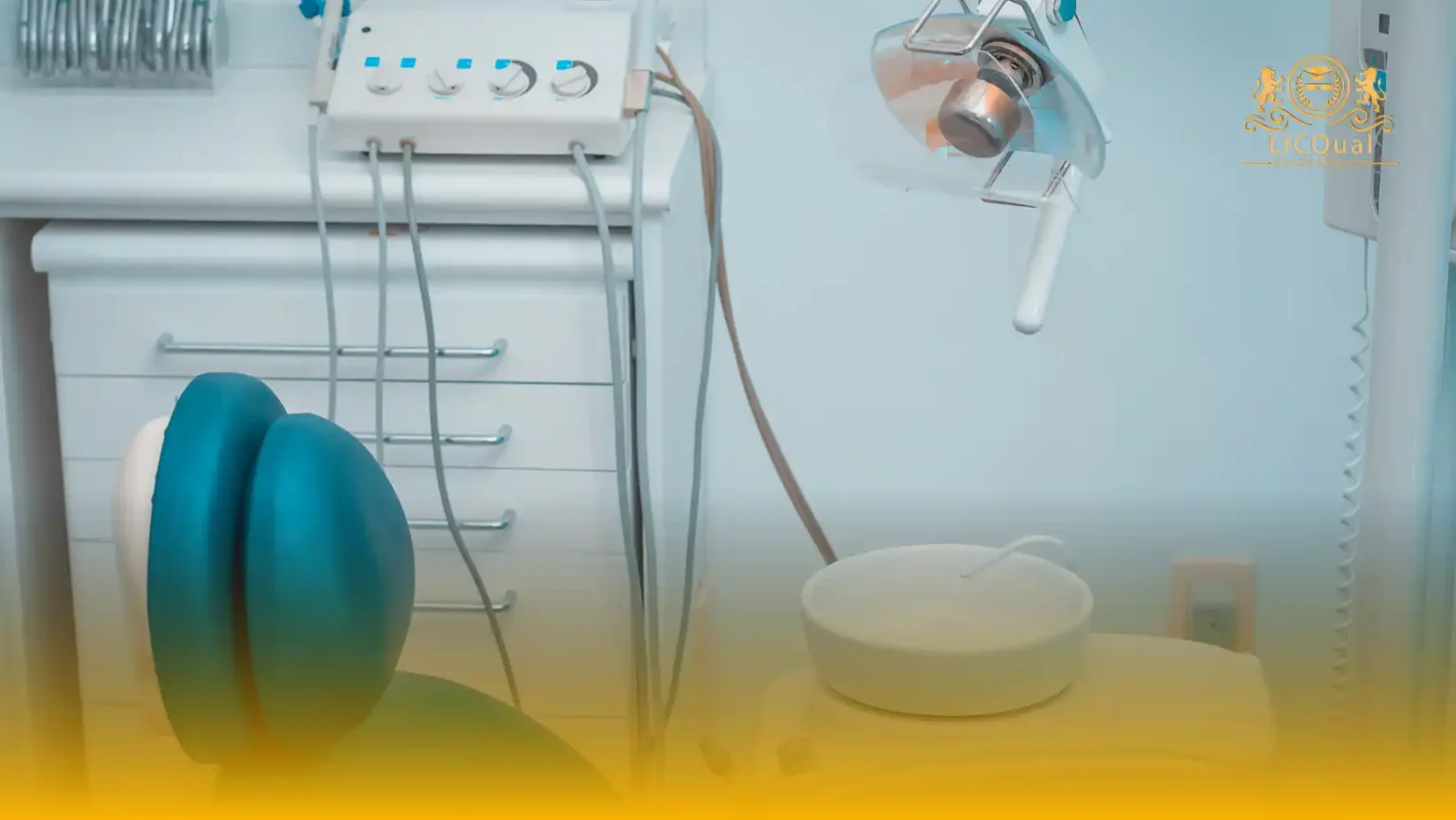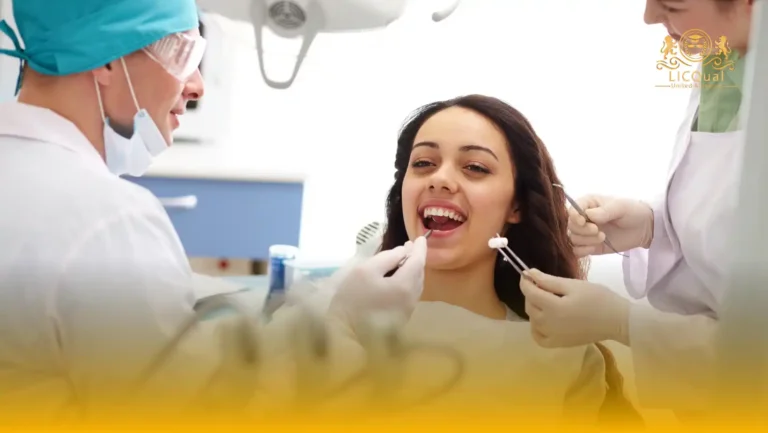The LICQual Level 3 Diploma in Forensic Odontology is a specialised qualification designed for dental and healthcare professionals who want to advance their expertise in the field of forensic science and dental identification. This diploma focuses on the application of dental knowledge in legal and investigative contexts, offering learners the opportunity to contribute to criminal investigations, disaster victim identification, and medico-legal cases.
Unlike introductory qualifications, this programme is not intended for fresh candidates. It is specifically aimed at professionals who wish to expand their knowledge, strengthen their career prospects, and meet the requirements of Continuing Professional Development (CPD). Learners will gain advanced skills in forensic dental analysis, bite mark investigation, dental age estimation, and the interpretation of dental evidence in legal settings.
Centres delivering the LICQual Level 3 Diploma in Forensic Odontology must ensure that they have competent and highly qualified staff, along with access to all the necessary facilities, tools, and study resources. This ensures that every learner receives a robust and high-quality education, combining both theoretical understanding and practical application.
By completing this qualification, learners will enhance their ability to work within interdisciplinary forensic teams, provide expert evidence in legal cases, and contribute to both national and international forensic investigations. The diploma supports career development, strengthens professional credibility, and offers a strong foundation for progression to higher-level qualifications in forensic dentistry and related fields.
Course Overview
Qualification Title
LICQual Level 3 Diploma in Forensic Odontology
Total Units
6
Total Credits
60
GLH
240
Qualification #
LICQ2200664
Qualification Specification
To enroll in the LICQual Level 3 Diploma in Forensic Odontology, applicants must meet the following criteria:
|
Qualification# |
Unit Title |
Credits |
GLH |
|---|---|---|---|
|
LICQ2200664-1 |
Principles and Scope of Forensic Odontology |
10 |
40 |
|
LICQ2200664-2 |
Dental and Craniofacial Anatomy in Forensic Contexts |
10 |
40 |
|
LICQ2200664-3 |
Methods of Human Identification in Forensic Odontology |
10 |
40 |
|
LICQ2200664-4 |
Bite Mark Analysis and Dental Evidence Examination |
10 |
40 |
|
LICQ2200664-5 |
Age Estimation and Post-Mortem Dental Profiling |
10 |
40 |
|
LICQ2200664-6 |
Ethical, Legal, and Professional Responsibilities in Forensic Odontology |
10 |
40 |
By the end of this course, learners will be able to:
Unit 1: Principles and Scope of Forensic Odontology
- Understand the role of forensic odontology within the wider field of forensic science.
- Identify the key applications of dental evidence in legal and investigative contexts.
- Analyse the historical development and global importance of forensic odontology.
- Evaluate the limitations and challenges associated with forensic dental investigations.
- Apply forensic principles to practical case scenarios.
Unit 2: Dental and Craniofacial Anatomy in Forensic Contexts
- Demonstrate detailed knowledge of dental, oral, and craniofacial anatomy relevant to forensic cases.
- Recognise anatomical variations and their forensic significance.
- Apply anatomical knowledge in the identification of individuals from dental remains.
- Understand the importance of accurate dental charting and record-keeping in forensic work.
- Relate craniofacial features to age, sex, and population differences.
Unit 3: Methods of Human Identification in Forensic Odontology
- Understand the primary and secondary methods of human identification using dental evidence.
- Apply comparative dental analysis techniques for individual identification.
- Evaluate the role of dental records, radiographs, and imaging in forensic investigations.
- Demonstrate knowledge of forensic anthropology and its relation to odontology.
- Assess the reliability and limitations of various identification methods.
Unit 4: Bite Mark Analysis and Dental Evidence Examination
- Understand the scientific principles behind bite mark analysis.
- Apply techniques for documenting, recording, and analysing bite marks.
- Evaluate the evidential value of bite marks in criminal cases.
- Recognise the controversies and limitations surrounding bite mark evidence.
- Demonstrate competence in handling and preserving dental evidence for legal use.
Unit 5: Age Estimation and Post-Mortem Dental Profiling
- Understand the principles and methods used in dental age estimation.
- Apply techniques for estimating age in both living and deceased individuals.
- Analyse post-mortem dental changes and their forensic significance.
- Develop skills in compiling post-mortem dental profiles for identification.
- Evaluate the accuracy and reliability of dental age estimation methods.
Unit 6: Ethical, Legal, and Professional Responsibilities in Forensic Odontology
- Understand the ethical obligations of forensic odontologists in practice.
- Apply legal frameworks and professional standards relevant to forensic dentistry.
- Recognise the importance of informed consent, confidentiality, and integrity in forensic work.
- Evaluate the role of expert witnesses and presentation of evidence in court.
- Demonstrate commitment to CPD and continuous professional development in forensic practice.
The LICQual Level 3 Diploma in Forensic Odontology is designed for professionals and learners passionate about combining dental science with forensic investigation. This qualification suits individuals who aim to understand how dental evidence supports criminal cases, human identification, and legal proceedings. Whether you are a dental professional, forensic science student, or law enforcement officer, this Level 3 Diploma in Forensic Odontology equips you with the skills to analyze, interpret, and report forensic dental findings with scientific precision and ethical responsibility.
1. Practicing Dentists and Dental Specialists
- Ideal for dentists seeking to expand their expertise into the field of forensic investigation.
- Learn the role of dental evidence in identifying victims and suspects.
- Gain practical insights into bite mark analysis and dental profiling.
- Understand medico-legal responsibilities and ethical considerations in forensic dentistry.
- Strengthen your portfolio with an international diploma in forensic odontology recognized worldwide.
2. Dental Hygienists and Technicians
- Enhance your technical and analytical skills beyond clinical dentistry.
- Learn how dental structures and restorations aid in human identification.
- Understand how to handle, document, and preserve forensic dental evidence.
- Collaborate effectively with forensic teams and investigators.
- Build career pathways in forensic dental laboratories and academic institutions.
3. Forensic Science Students and Graduates
- Perfect for learners aiming to specialize in forensic dentistry.
- Gain a detailed understanding of forensic odontology procedures and analysis.
- Study how dental data integrates with other forensic evidence.
- Participate in realistic case studies to develop investigative competence.
- Strengthen your resume with a Level 3 Forensic Odontology Diploma that enhances employability.
4. Law Enforcement and Investigation Officers
- Learn how forensic odontology contributes to criminal investigations.
- Understand the scientific process behind bite mark verification and victim identification.
- Gain essential knowledge to interpret forensic dental reports accurately.
- Collaborate effectively with forensic odontologists and dental experts.
- Enhance professional development with specialized forensic training.
5. Medico-Legal and Forensic Professionals
- Ideal for coroners, pathologists, and medico-legal officers involved in forensic analysis.
- Deepen your knowledge of dental evidence interpretation in court cases.
- Understand ethical reporting and courtroom presentation techniques.
- Learn how to integrate forensic dental data with autopsy findings.
- Gain recognition through an accredited forensic odontology qualification.
6. Academic Researchers and Educators
- Suitable for teachers and researchers in forensic dentistry and dental sciences.
- Stay updated on emerging trends and international forensic protocols.
- Gain structured insights to support curriculum development and training.
- Contribute to forensic research and professional publications.
- Build authority as a subject expert in forensic odontology education.
7. International Learners and Career Changers
- Perfect for individuals transitioning into forensic sciences from related fields.
- Access globally recognized forensic odontology training online.
- Learn adaptable techniques applicable in various international legal systems.
- Develop a new professional identity as a certified forensic odontologist.
- Enjoy flexible study options with the LICQual Level 3 Diploma in Forensic Odontology.
To deliver the LICQual Level 3 Diploma in Forensic Odontology effectively and maintain high-quality training standards, centres must meet the following requirements:
- Qualified and Experienced Staff: Centres must employ trainers and assessors with appropriate qualifications and professional experience in dentistry, forensic odontology, or related fields.
- Specialist Facilities: Access to safe, hygienic, and fully equipped facilities, including dental laboratories, clinical spaces, and forensic training environments.
- Learning and Teaching Resources: Provision of up-to-date study materials, digital resources, forensic case studies, and access to relevant research publications.
- Forensic Tools and Equipment: Centres should provide modern diagnostic tools, imaging systems, and appropriate resources for bite mark analysis, dental profiling, and identification techniques.
- Assessment and Quality Assurance: A robust system for fair and transparent assessment, with clear internal quality assurance procedures to support learner success.
- Learner Support Services: Academic guidance, mentoring, and access to Continuing Professional Development (CPD) resources to enhance the learner experience.
- Compliance with Ethical and Legal Standards: Centres must operate in line with professional, legal, and ethical requirements related to forensic and dental education.
- Commitment to Excellence: Continuous monitoring, feedback, and improvement processes to ensure consistent delivery of world-class training.
These requirements ensure that learners receive a comprehensive and professionally delivered education, preparing them to apply forensic odontology skills confidently in investigative and legal contexts.
Assessment and Verification
All units within this qualification are subject to internal assessment by the approved centre and external verification by LICQual. The qualification follows a criterion-referenced assessment approach, ensuring that learners meet all specified learning outcomes.
To achieve a ‘Pass’ in any unit, learners must provide valid, sufficient, and authentic evidence demonstrating their attainment of all learning outcomes and compliance with the prescribed assessment criteria. The Assessor is responsible for evaluating the evidence and determining whether the learner has successfully met the required standards.
Assessors must maintain a clear and comprehensive audit trail, documenting the basis for their assessment decisions to ensure transparency, consistency, and compliance with quality assurance requirements.







